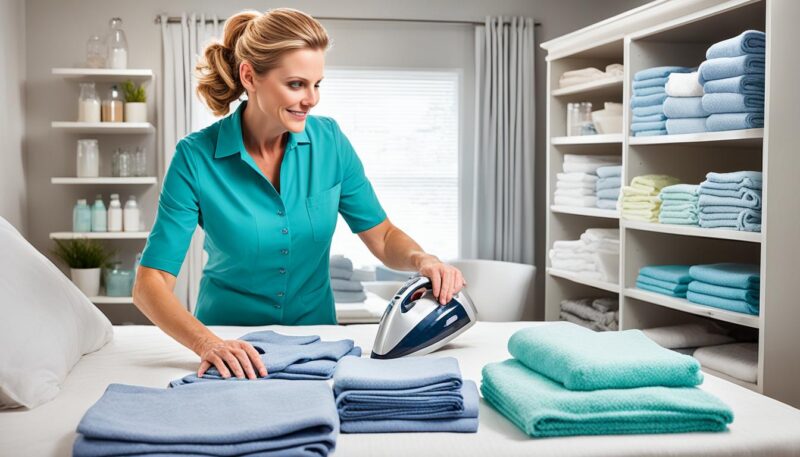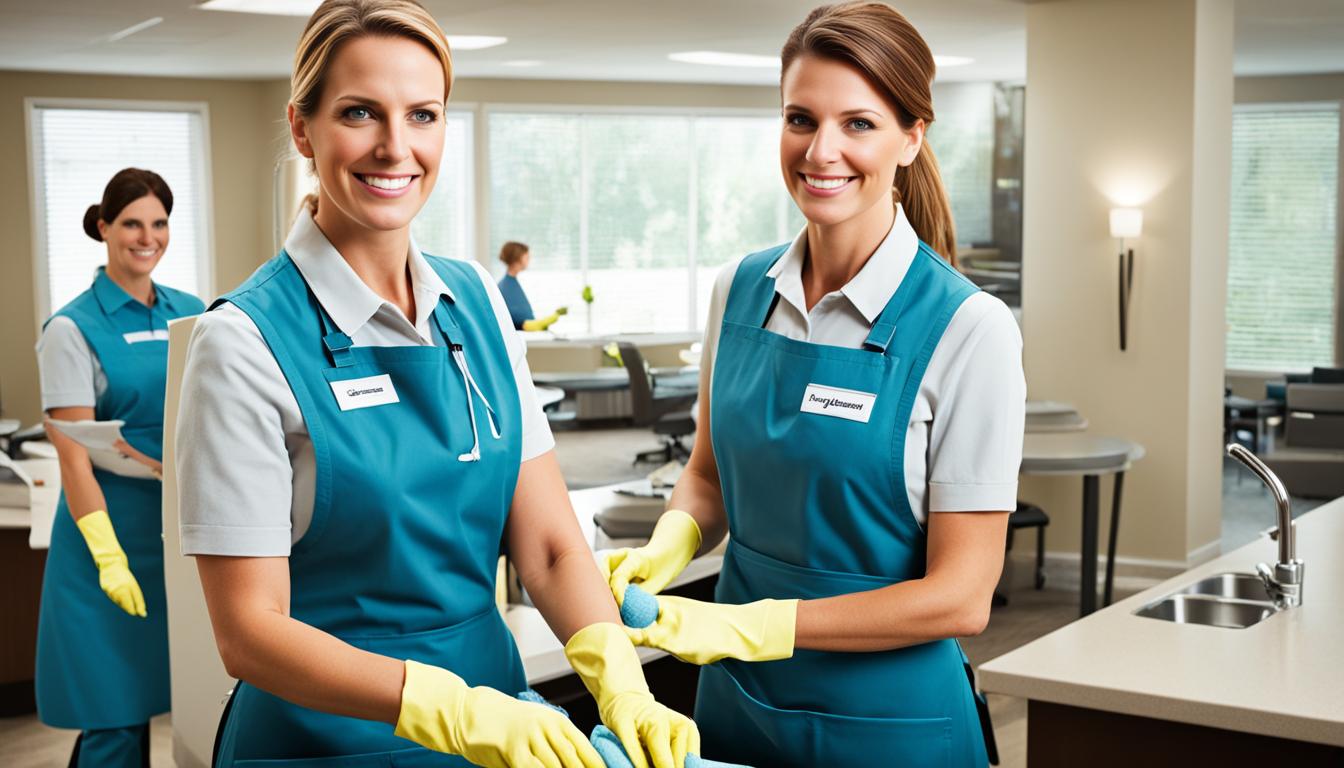At the core of any well-run household or establishment lies a keen attention to cleanliness and order, paramount responsibilities entrusted to housekeeping professionals. Defining the best housekeeping job description not only draws in candidates with the highest caliber but also ensures the consistent upkeep and alluring ambience of a residence or a service-focused environment. Crafting a professional housekeeping job description requires an understanding of the integral functions and the impact of these roles on the overall guest and resident satisfaction.
Key Takeaways
- A well-defined job description is vital for attracting and retaining skilled housekeeping staff.
- Housekeeping roles are essential in maintaining the standards of living and service quality.
- Understanding the scope of housekeeping duties can refine recruitment processes.
- Professionalism in housekeeping encompasses a range of detailed tasks and personal interactions.
- Communicating expectations through clear job descriptions sets the stage for operational success.
- Integrating essential qualifications and qualities can guide the selection of potential candidates.
- Optimized language in job descriptions aids in reaching experienced and dedicated professionals.
Introduction to Housekeeping Roles
The essential role of a housekeeper extends beyond mere cleaning; it encompasses the multi-faceted duties of maintaining the cleanliness, orderliness, and overall aesthetic of a variety of environments. This integral housekeeping job role and responsibilities ensure the comfort and satisfaction of residents and guests across settings, from bustling hotels to serene residential homes, fast-paced corporate offices to critical care facilities in hospitals. The housekeeper’s role is not confined to a singular task but is a collection of various functions that contribute to the efficient operation of any institution requiring their services.
Each setting presents unique challenges and sets specific duties of a housekeeper. In a hotel, for example, the housekeeping staff is responsible for presenting a welcoming atmosphere amidst a high turnover of guests, while in a residential setting, the same staff must adapt to individual household preferences and routines. In a healthcare setting, housekeepers are pivotal in preventing the spread of infectious diseases through rigorous sanitation practices.
- Ensuring the cleanliness of rooms and communal areas
- Maintaining hygiene standards to health regulations
- Providing thorough cleaning and sanitation
- Replenishing amenities and supplies
- Offering attentive customer service in hospitality contexts
- Implementing waste management practices
- Assisting in the maintenance of furniture and fixtures
Understanding these foundational duties is crucial for anyone aspiring to or currently navigating through a career in housekeeping. Recognizing the diverse nature of the housekeeping job role and responsibilities is the first step towards garnering the respect and appreciation for the pivotal services these professionals provide.
Key Responsibilities in Housekeeper Job Roles
Understanding the array of housekeeper job responsibilities is paramount for individuals pursuing a career in this field as well as for employers who wish to hire the most qualified candidates. Housekeepers play an integral role in maintaining the cleanliness, comfort, and smooth operation of residential homes, hotels, and other establishments. In this section, we delve into the core housekeeping job duties and tasks that are quintessential to the role, ensuring high standards of cleanliness and guest satisfaction.
Standard Housekeeping Tasks
At the heart of housekeeping job duties and tasks lies a comprehensive list of cleaning responsibilities. These include but are not limited to:
- Thorough cleaning of rooms, hallways, and common areas
- Dusting furniture, fixtures, and appliances
- Vacuuming carpets and mopping floors
- Changing linens, making beds, and replenishing room supplies
- Cleaning and sanitizing bathrooms and kitchens
- Managing waste removal and recycling
Maintenance and Stock Rotation
Maintenance and stock rotation are pivotal in sustaining the operational efficiency of housekeeping services. A housekeeper is typically tasked with:
- Monitoring and maintaining the inventory of housekeeping supplies
- Ensuring timely restocking of amenities in guest rooms and restrooms
- Conducting regular inspections of physical assets for wear and tear
- Reporting any maintenance issues or safety hazards to the management
- Rotating cleaning supplies to reduce waste and maintain quality
Guest Interaction and Service
Interfacing with guests is an essential aspect of a housekeeper’s role, often directly influencing the guest experience. This facet of the job requires:
- Providing polite and professional service to guests
- Responding efficiently to guest inquiries and requests
- Ensuring privacy and confidentiality as per hotel policy or homeowner wishes
- Adhering to a high standard of customer service and guest satisfaction
As each facility may have its unique requirements, it is paramount for housekeeping staff to adapt their skills and knowledge to cater to specific housekeeper job responsibilities. Furthermore, they should consistently exhibit the ability to perform these housekeeping job duties and tasks with precision and care to maintain the esteemed standards set within the industry.

Essential Qualities in a Housekeeper
Understanding the fundamental housekeeping job requirements is critical for employers to select candidates who will be able to deliver the required level of service in the housekeeping job role and responsibilities. A housekeeper’s personal characteristics are paramount in achieving the high standards expected within the role. Among these are reliability, attention to detail, and a strong work ethic, which contribute not only to the quality of the cleaning but also to the overall guest experience.
Below is a table outlining key qualities and their significance to the housekeeping position:
| Quality | Importance | Examples in Housekeeping |
|---|---|---|
| Reliability | Consistency in quality and punctuality builds trust with employers and clients. | Regularly completing tasks on schedule and showing up for shifts on time. |
| Honesty | Maintaining integrity, especially in private spaces, underpins the professionalism of the role. | Reporting any damages or issues found promptly and accurately. |
| Discretion | Respect for privacy ensures clients feel secure with housekeepers in their personal spaces. | Confidential handling of all client-related information and personal belongings. |
| Attention to Detail | Critical for delivering high-quality outcomes and noticing subtle issues before they become problems. | Not overlooking small areas during cleaning and arrangement tasks. |
| Physical Stamina | Capability to perform physically demanding tasks is essential for handling day-long chores. | Efficiently managing multiple floors and heavy cleaning equipment. |
| Customer Service Oriented | Being attentive to guest needs enhances the overall experience and satisfaction. | Providing helpful interactions and adapting cleaning schedules to guest preferences. |
The amalgamation of these traits within the housekeeping job role and responsibilities facilitates a harmonious and efficient working environment. Candidates who exemplify these qualities are not only adept at their tasks but also serve as the backbone for maintaining the high standards of cleanliness and service that the hospitality industry is known for.
Housekeeping Skills and Qualifications
To excel in the field of housekeeping, certain skills and qualifications are not just recommended but essential. Beyond the ability to handle a variety of cleaning devices and familiarity with cleaning techniques, a housekeeper’s role encompasses a range of competencies that are crucial for success in this physically demanding and detail-oriented profession.
Required Educational Background
Although housekeeping positions often require minimal formal education, candidates with a high school diploma or equivalent are generally preferred. Key is that individuals possess pertinent housekeeping skills and qualifications gleaned from hands-on experience or vocational training. Those seeking advancement might pursue certifications such as the Certified Executive Housekeeper or Registered Executive Housekeeper designation from the International Executive Housekeepers Association.
Physical Abilities and Stamina
Housekeeping is a physically intensive job requiring considerable stamina and strength. Activities such as lifting, bending, and standing for long periods are routine, making a certain level of physical fitness a necessity. Employers often list such physical abilities among the key housekeeping job requirements to ensure the safety and well-being of their staff.
Attention to Detail and Organization
Attention to detail and organizational skills round out the suite of essential qualifications for a professional housekeeper. Precision in cleaning, fastidious care of guest areas, and efficient organization of cleaning schedules denote an employee who can meet the high standards of modern housekeeping job requirements.
Best Housekeeping Job Description Template
Creating a standout job description is a critical step in attracting the right talent for housekeeping positions. An effective description does more than list duties; it communicates the company’s values and the role’s significance, providing candidates with a clear picture of expectations and the work environment. Below are steps and tips to ensure you create a comprehensive housekeeping job description template that not only attracts applicants but also integrates search optimization techniques to give your listing maximum visibility.
Crafting an Effective Job Listing
To craft a job listing that captures the essence of the housekeeping position, start with a clear job title. Follow this with a concise summary of the role’s purpose within the company, highlighting the impact of meticulous housekeeping on client satisfaction and business operations. Break down responsibilities into bullet points for readability, specifying daily tasks, necessary interaction with clients or other team members, and any special projects expected to be undertaken.
- Detailed description of cleaning duties and areas of responsibility
- Outline of expected standards of cleanliness and organization
- Explanation of health and safety protocols to be followed
- Details on any equipment or cleaning solutions to be used
- Information on reporting structure and performance evaluations
Integrating Keywords for Job Search Optimization
To ensure your housekeeping job description is easily found by job seekers, integration of keywords is essential. Use relevant keywords and phrases that potential applicants are likely to use in their job searches. Be strategic yet logical, peppering these keywords throughout the job title, summary, and key responsibilities. However, avoid keyword stuffing as it can detract from the readability and professionalism of the listing.
Consider the terms like ‘housekeeping standards’, ‘cleaning protocols’, or ‘guest room attendant’ based on the specificities of the position. Always tailor the language so that it not only aligns with common industry terms but also reflects the unique aspects of the job at your particular company.
Remember, a well-designed housekeeping job description template is more than a list of duties; it is the first step in building a strong foundation for your housekeeping team.
Key Traits and Competences for Housekeeping Staff
As we draw the curtain on our in-depth examination of the housekeeping domain, it becomes evident that the myriad of housekeeping job duties and tasks are prefaced on a bedrock of key personal traits and competences. Professionalism in housekeeping not only involves the meticulous execution of cleaning and maintenance but also hinges on the embodiment of certain characteristics that distinguish a proficient housekeeper from the average. As illustrated throughout this article, the housekeeping job role and responsibilities are manifold and the attributes of the staff fulfilling these roles are critical for operational success.
Foremost among these traits are dependability and attention to detail, two competencies that ensure the seamless function of daily operations within the housekeeping sector. Whether it’s a high-end hotel or a bustling hospital ward, housekeeping staff must apply unwavering diligence and keen observation to maintain environments that are not just clean, but also safe and conducive to their respective activities. The housekeeping role consistently calls for individuals who can efficiently manage their tasks with minimal supervision, reflecting the autonomous nature of the work involved.
To conclude, it is clear that the crafting of a comprehensive job description for housekeeping roles is a fundamental step in attracting and securing individuals who are adept at navigating the dynamic landscape of housekeeping responsibilities. A well-defined job description acts as both a beacon and a benchmark—it attracts those who are prepared for the challenges it presents, and it sets forth the standards by which their performance is measured. In the pursuit of excellence in housekeeping, only those equipped with the essential traits and competences can genuinely uphold the highest of standards in cleanliness, organization, and guest satisfaction.
